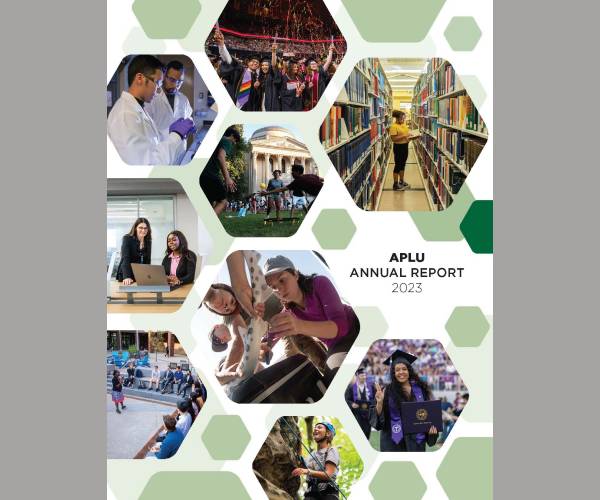Building a Future Workforce for All Learners
- University innovation through partnerships with educational and workforce organizations;
- Designing flexibility for learners from diverse backgrounds; and
- Innovations that provide evidence-based practices for helping students gain skills, credentials that demonstrate employer-validated skills, and support to achieve their goals.
Amid a record-shattering number of American workers quitting their jobs to seek better opportunities, the Association of Public and Land-grant Universities (APLU) today released a report outlining the ways public research universities can innovate to meet the upskilling needs of a rapidly changing labor force so workers can attain better careers. The report, Building a Future Workforce for All Learners: How Public and Land-grant Universities and Urban Serving Universities Drive Innovative Solutions, also outlines how public research universities are deploying a diverse array of strategies to build 21st Century skills for learners through new models for higher education and life-long learning.
[Read the Report: Building a Future Workforce for All Learners: How Public and Land-grant Universities and Urban Serving Universities Drive Innovative Solutions]
“Public universities are helping learners of all backgrounds build skills needed for lasting career success in the 21st Century,” said APLU President Peter McPherson. “Today’s report both spotlights the excellent work public universities are doing and offers recommendations for institutions to consider as they seek to better meet the needs of a growing number of students and workers looking to gain in-demand skills.”
A record 4.4 million workers left their jobs in September, a continuation of a months-long acceleration in the number of workers seeking better employment prospects or the training necessary to obtain them. The report released today provides recommendations for public universities to consider as they work to provide the flexibility to gain the skills needed for short-term job opportunities while earning credit for a longer-term degree. The report outlines university innovative examples that address three related trends: a rapidly changing economy generating vast training needs, the shifting demographics of students and growing demand for 21 Century Skills.
To help public universities meet the needs of all learners, the report makes the case for:
- University innovation through partnerships with educational and workforce organizations: Meeting learner and workforce needs requires public higher education to build partnerships with employers, community colleges, workforce boards, and other important education and workforce stakeholders to accomplish important goals for employers and students.
- Designing flexibility for learners from diverse backgrounds: With fewer students taking the “traditional” route of entering college directly after high school and continuing until they have obtained a bachelor’s degree, students will need additional flexibility in the future.
- Innovations that provide evidence-based practices for helping students gain skills, credentials that demonstrate employer-validated skills, and support to achieve their goals: Incorporating innovations that include opportunities to earn new skills or reskill/upskill work-and-learn models, and interdisciplinary study programs. Additionally, institutions can work to provide greater skills transparency through employer-verified credentials and digital badges. Lastly, universities can aim to make better use of technology to personalize education to improve student success. 21st century skills, work-and-learn models, and interdisciplinary study programs. Additionally, institutions can work to provide greater skills transparency through employer-verified credentials and digital badges. Lastly, universities can aim to make better use of technology to personalize education to improve student success.
To help public universities better meet these needs, APLU is convening its members to share, test, and scale successful models by introducing a learning community called Addressing the Future of the 21st-Century Workforce: Sharing and Scaling Successful Innovation. A partnership between APLU’s Commission on Economic and Community Engagement and Council on Academic Affairs and the Coalition of Urban Serving Universities, the learning community, will provide engagement opportunities and learnings to drive new partnerships, guided pathways, and innovation into credentials and degrees.
“The learning community will support universities as they collaborate to surface successful models, codify the factors that make them successful, and apply them to the specific workforce needs of each community,” said Andréa Rodriguez, Director at the Coalition of Urban Serving Universities, and Sheila Martin, Vice President, Economic Development & Community Engagement at APLU
Bachelor’s degree holders continue to enjoy a number of labor market advantages. Compared with workers whose highest degree is a high school diploma, bachelor’s degree holders have median annual earnings that are $24,900 higher as well as an unemployment rate half as high. Still, the needs of learners extend beyond those seeking a bachelor’s degree.




Stay Connected
X (formerly Twitter)
Facebook
YouTube
LinkedIn
RSS